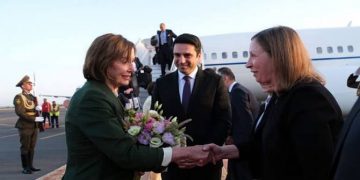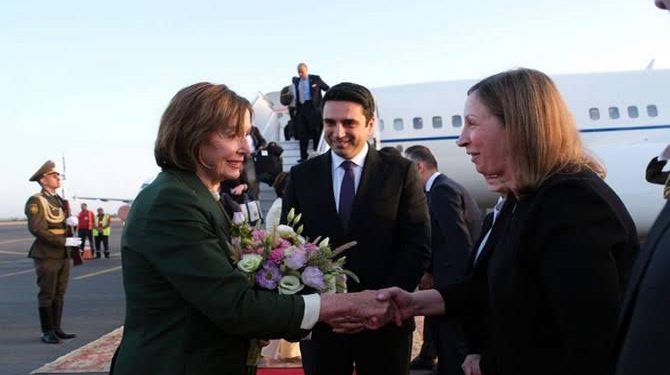By Oyintari Ben
The highest level American official to visit Armenia since it earned independence 30 years ago is the House Speaker, who has already put herself in the middle of major international confrontations.
A congressional delegation led by Speaker Nancy Pelosi came into Armenia on Saturday to demonstrate support for the small nation in the south Caucasus after conflict broke out with neighbouring Azerbaijan this week, which resulted in the deaths of over 200 people.
In order to express “the strong and ongoing support of the United States” for Armenia and for a long-term resolution to the conflict between the two neighbours over the disputed territory of Nagorno-Karabakh, Ms. Pelosi said she would meet with Prime Minister Nikol Pashinyan in the country’s capital, Yerevan, as well as with other officials.
Prior to the midterm elections in November, Ms. Pelosi’s travel was viewed as a political move. According to a statement from her office, she is the highest-ranking American official to visit Armenia since the country earned independence 30 years ago with the dissolution of the Soviet Union. Representatives Jackie Speier and Anna G. Eshoo from California, where there is a sizable Armenian community, accompanied her.
The trip, which represents Ms. Pelosi’s most recent attempt to exercise the diplomatic muscle of the legislative branch, comes as war breaks out in Europe and emphasizes the shifting power dynamics in the region of the former Soviet Union where the United States has long sought to expand its influence. Armenia now seems especially vulnerable as a result of the latest fighting, which has spread into Armenia and is the worst since a full-scale war there in 2020 that killed thousands of people.
The surprisingly difficult nature of the war in Ukraine has weakened Russia, Armenia’s longstanding protector, and Azerbaijan has aggressively urged Mr. Pashinyan to accept a peace accord that would recognize Azerbaijani sovereignty over the disputed region.
After gaining independence, Azerbaijan became wealthy through the development of its oil and gas deposits and developed a well-trained military. It has taken care to preserve close connections with Moscow while forging an alliance in the region with NATO member Turkey, which has long had a hostile relationship with Armenia. There are no ongoing formal diplomatic ties between Turkey and Armenia.
Mr. Pashinyan has stated that he intends to sign a peace agreement with Azerbaijan, but he is facing significant domestic pressure from opponents who have labelled the agreement as traitorous.
On Tuesday, fighting broke out, with both sides exchanging mortars and artillery across their common border. Armenia stated that Azerbaijan had launched an offensive that penetrated far into its territory while Azerbaijan accused Armenia of engaging in “serious provocations.” Within hours, Russia arranged a cease-fire, but fighting persisted into the next day. Analysts suggested that American authorities had a hand in securing the ceasefire.
She claimed that the Armenian side lacked the ability to organize a proper military defence to stop the Azerbaijani troops from advancing further into its territory. “A minor incident can spark fresh fighting.”
At a government meeting on Friday, Mr. Pashinyan said that Armenia had lost 135 soldiers in recent Azerbaijani attacks, and he added that this number was certain to climb as many of the injured died from their wounds. On Tuesday, Azerbaijan reported losing 50 soldiers from its armed forces and border guards on the first day.
The third-highest ranking official in the U.S. government, Ms. Pelosi, has recently placed herself in the middle of some of the most contentious disputes in the globe. She met with President Volodymyr Zelensky in Kyiv, the capital of Ukraine, in May, then she went to Taiwan in August, which enraged China.
Former American ambassador to Azerbaijan Matthew Bryza said, “Speaker Pelosi looks to be trying to exercise the U.S. Congress’s diplomatic muscles and meddle in a bilateral regional crisis, potentially without close coordination with the executive branch, as when she recently visited Taiwan.”
He claimed that she was only looking at one side of the conflict. He said Ms. Pelosi was “representing the Armenian government’s position that Azerbaijan began this latest round of fighting” by describing her visit as an endeavour to protect human rights and the dignity of all people.
Zaur Shiriyev, a South Caucasus analyst for the International Crisis Group in Baku, Azerbaijan, said that American diplomats have been working hard to restart talks between Azerbaijan and Armenia. However, if Ms. Pelosi’s intervention upset those efforts, “then U.S. diplomatic efforts will not be perceived favourably in Baku,” he added.




































